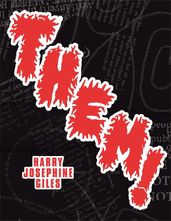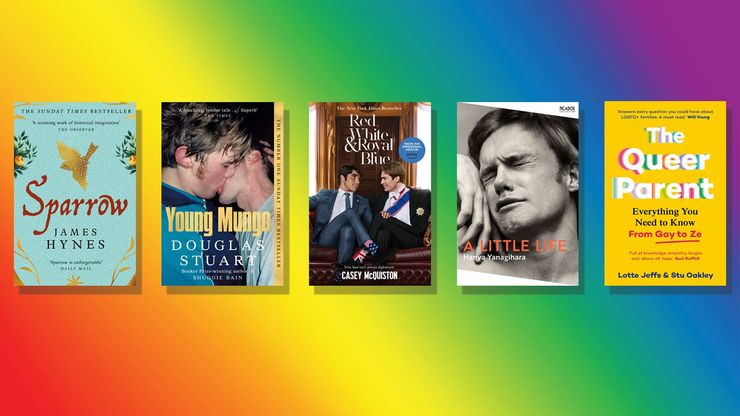'We make ourselves through words': writing trans lives and stories
Writer Harry Josephine Giles, author of the award-winning science fiction book Deep Wheel Orcadia and new poetry collection Them!, on trans lives in literature.

When there aren’t the words to describe your desires, you have to write yourself into being. Transition is a glittering act of self-authorship: the choice to write your name newly into the world, to take the shattering experiences you’ve been given and reassemble them into a stranger, sharper story. Throughout my own transition, I’ve read trans authors in feverish hope, searching for the pattern of words that reflects my own pattern of thought – or, more often, for the shocking phrase that shakes loose a new feeling.
Many of the authors to whom I’m most drawn are those who wrote before the word 'trans', with its various suffixes, came along to order our disobedient experiences. There are revelations in the way they reach for the right language. In the early twentieth century, the English author Bryher wrote of her Two Selves (1923): “Jammed against each other, disjointed and ill-fitting [. . .] Two personalities uneasy by their juxtaposition. As happy together as if a sharp sword were thrust into a golf bag for a sheath.” Radclyffe Hall, known to friends as John, adopted the medical language of 'invert' to describe her own version of the experience, both personally and in The Well of Loneliness (1928), experiences that are “as much a part of what people call nature as anyone else” but are “unexplained as yet”. Most famously, in Orlando (1928), Virginia Woolf used a narrative fantasy to imagine and celebrate the gender transgressions of the queer Bloomsbury milieu. Some of these writers might now describe as lesbian, or trans, or bisexual, or non-binary – but the truest language for them is always the language they themselves used.
‘Some of these writers might now describe as lesbian, or trans, or bisexual, or non-binary – but the truest language for them is always the language they themselves used.’
Such a lack of explanation confounded other authors. The Scottish novelist and critic William Sharp, in his posthumous 1905 note to his friends admitting that he was the same author as the mystical, celebrated and half-real Fiona MacLeod, said, “It is a mystery. I cannot explain. Perhaps you will intuitively understand or may come to understand.” William and Fiona wrote letters to each other, congratulated and chastised each other, and in letters explained that “My truest self, the self who is below all other selves, and my most intimate life and joys and sufferings, thoughts, emotions and dreams, must find expression, yet I cannot, save in this hidden way.” Reading Sharp and MacLeod, I feel both beauty and frustration in the ways they found to express what was hidden.
The “hidden way” appealed too to the lawyer, feminist, traitor and imperial apologist Thomas Baty, whose self-creation Irene Clyde, one of the most active writers in the early radical feminist journal Urania, wrote the extraordinary gender-free aristocrats' utopia Beatrice the Sixteenth (1909) and the anti-sex and anti-gender polemic Eve’s Sour Apples (1934), raising ideas that long-preempted the second wave: “Refusal and obloquy to all recognition of sex distinctions!” Clyde and Baty, the author and the lawyer, lived parallel lives of passion, occasionally revelatory and often misguided. If they had had access to the language we have now, would it have provided comfort, or would it have collapsed such complexity?
‘Trans authorship in the twentieth century, more than any medical case study, created the language we have today: the trans umbrella beneath which the many experiences of gender diversity shelter. We make ourselves through words.’
Trans authorship in the twentieth century was more often the product of gutter presses and political projects than established literature: we grew in the cracks. Red Jordan Arobateau (1943 – 2021), who was likely our most prolific author, charted his own journey through butchness and transmasculinity in a genre-promiscuous literary journey through memoirs, road novels, science fiction, street realism and pornography, publishing himself when others weren’t ready. Fragments of trans fiction can be found in the radical journals and zines of the 90s, like Gendertrash and TransSisters; from the same scene, the monumental achievement of Leslie Feinberg’s Stone Butch Blues (1993) emerged as part of hir lifelong political project to build a revolutionary coalition of gender rebels. This writing, more than any medical case study, created the language we have today: the trans umbrella beneath which the many experiences of gender diversity shelter. We make ourselves through words.
That same quest for self-understanding powers contemporary trans literature. It’s there in coming of age fiction like Mason Deaver’s I Wish You All the Best (2019), Zayn Joukhadar’s The Thirty Names of Night (2021) or Kai Cheng Thom’s Fierce Femmes and Notorious Liars (2016), in which the hero’s journey of the novel is as much to find the understanding to express what’s felt so deeply as it is to survive the dangerous worlds into which we transition.
‘Some of the most unsettling stories are those a long way down that endless road. What happens when a trans person has found herself, named herself, and now must find a way to live?’
Wherever trans authors' characters play across borders of gender, they disrupt other worlds too. Writing the world in a trans way changes that world. Thus, in the magical realism of Camilla Sosa Villada’s The Queens of Sarmiento Park (2022), travestis’ bodies change beyond what’s humanly possible; in Isabel Waidner’s Cory Fah Does Social Mobility (2023), spacetime and literary genre are promiscuously undone; in Andrea Lawlor’s Paul Takes the Form of a Mortal Girl (2017), queer America is observed and undermined as Orlando did for other empires. We’re found in the past and the present, in the historical fiction of Jordy Rosenberg’s Confessions of a Fox (2018) and the science fiction of Rivers Solomon’s An Unkindness of Ghosts (2017), questioning each world we find ourselves in, creating the histories and possibilities we’ve been denied.
Some of the most unsettling stories are those a long way down that endless road. What happens when a trans person has found herself, named herself, and now must find a way to live? In Nevada (2013), a contemporary classic so shaking that “Have you read Nevada?” became a 2010s cliché, transition has already happened, the self has already been named, and our lost protagonist has to face up to the fact that this answered no more than one of the questions of being. Far from being the conclusion of the plot of life, transition is simply a point of departure. The new language is a question, not an answer.
Them!
by Harry Josephine Giles
Them! by Harry Josephine Giles is a challenging and subversive collection of poems about trans life as it is lived today, through the lenses of work, technology and ecology. Witty, candid, furious, and always compelling, Them! negotiates the fraught and fruitful space between the worlds of ‘online’ and the ‘outside’, and how they fuse and diverge in the imagination.











